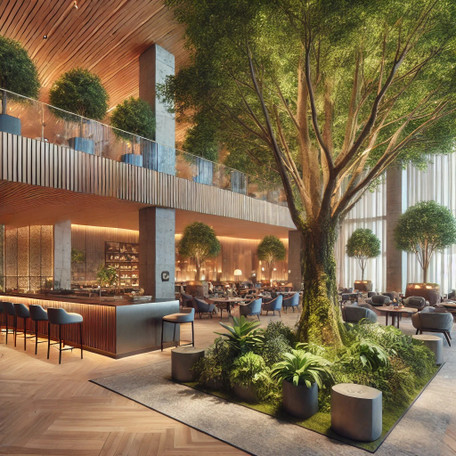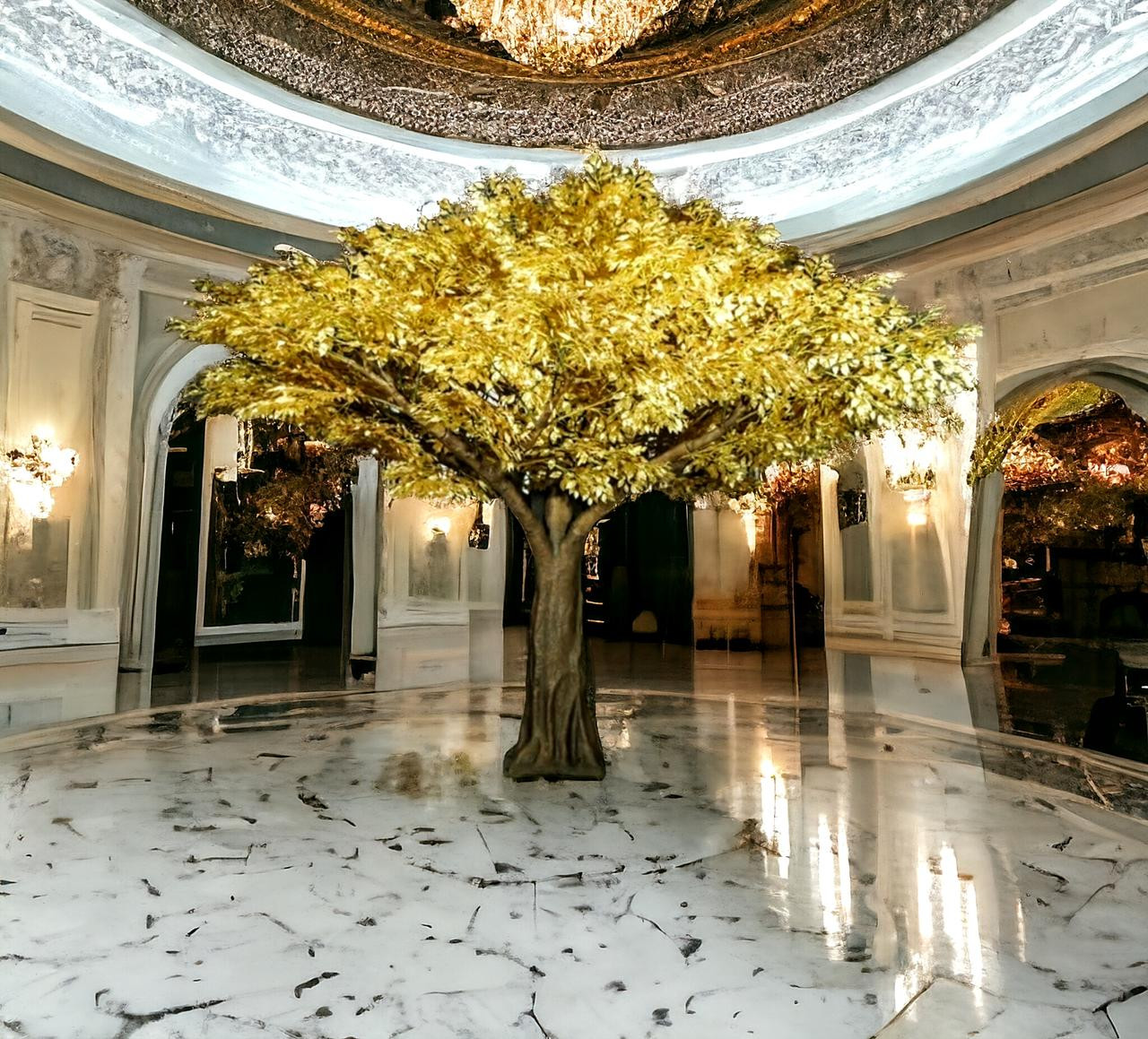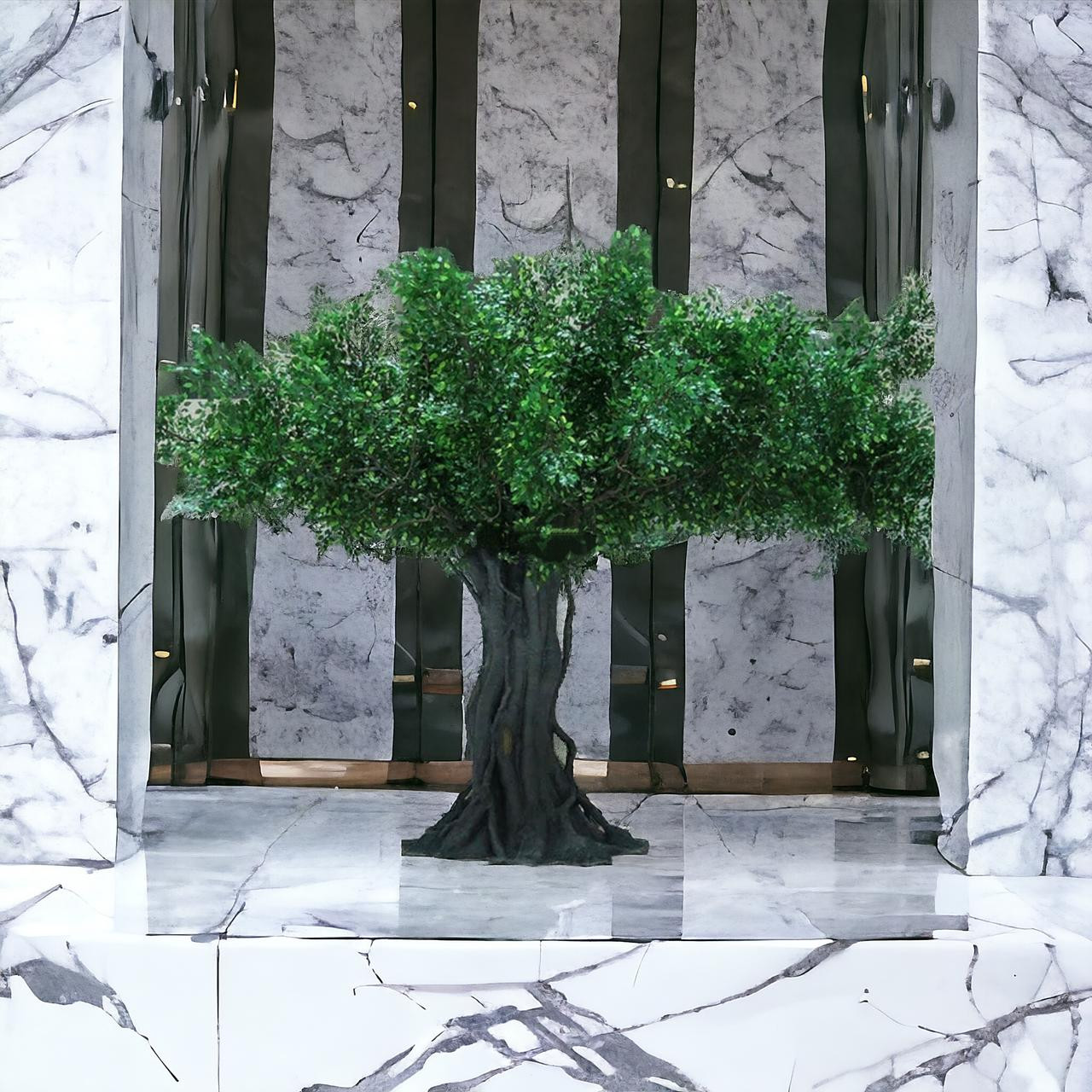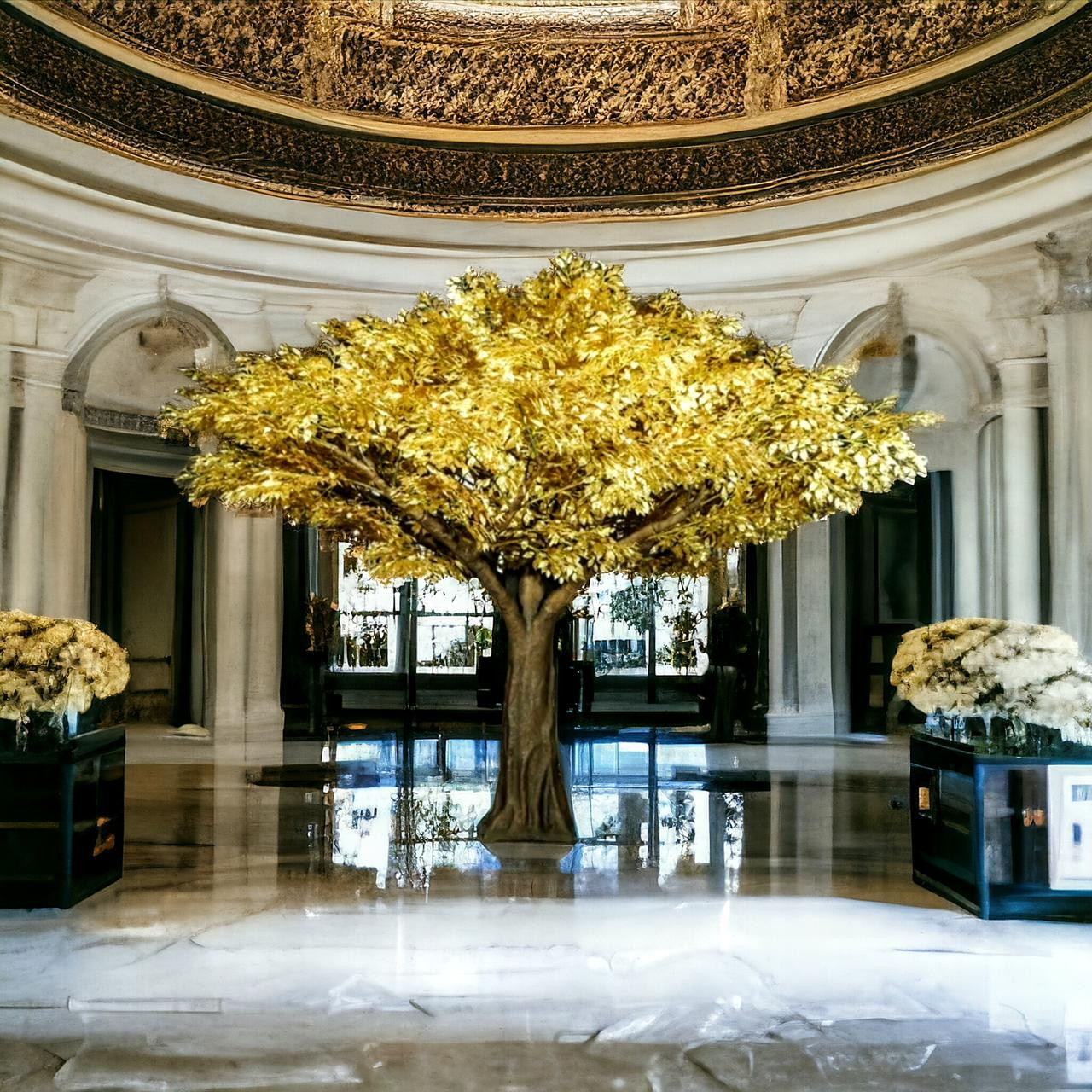Sustainable Decor Solutions: Why Artificial Trees are a Smart Choice for Eco-Conscious Hotels and Restaurants
12th Aug 2024
Sustainable Decor Solutions: Why Artificial Trees are a Smart Choice for Eco-Conscious Hotels and Restaurants
In today's world, sustainability is no longer just a trend; it's a necessity. As consumers become more environmentally conscious, businesses in the hospitality industry are under increasing pressure to adopt sustainable practices. Hotels and restaurants, in particular, are seeking ways to reduce their environmental footprint while still providing an exceptional guest experience. One of the most innovative and effective solutions in this regard is the use of artificial trees as part of their decor.
Artificial trees offer a unique combination of aesthetic appeal, practicality, and environmental benefits that make them a smart choice for eco-conscious hotels and restaurants. In this blog post, we'll explore the many reasons why artificial trees are a sustainable decor solution, emphasizing their durability, low maintenance requirements, and the environmental advantages they offer over real plants.
The Environmental Impact of Traditional Greenery in Hospitality
Before diving into the benefits of artificial trees, it's essential to understand the environmental impact of traditional greenery in the hospitality industry. Live plants and trees, while beautiful and beneficial in many ways, can also present significant sustainability challenges, especially when used in large quantities or in environments that require meticulous upkeep.
1. Water Consumption
One of the primary concerns with live plants and trees in hospitality settings is the amount of water required to keep them healthy. Hotels and restaurants often feature extensive landscaping, indoor gardens, and potted plants that need regular watering. In regions where water is a scarce resource, this can contribute to environmental strain. Furthermore, overwatering can lead to water waste and additional environmental impact.
2. Energy Use
Maintaining live plants, particularly indoors, often requires artificial lighting to simulate sunlight. This can lead to increased energy consumption, particularly in spaces where natural light is limited. Additionally, maintaining the right temperature and humidity levels for certain plants may require the use of heating, ventilation, and air conditioning (HVAC) systems, further increasing energy use.
3. Chemical Use
Pesticides, fertilizers, and other chemicals are frequently used to maintain the health and appearance of live plants. These chemicals can have harmful effects on the environment, particularly when they enter the soil and water supply. In addition to the environmental impact, the use of chemicals in indoor environments can also affect air quality and pose health risks to guests and staff.
4. Plant Replacement and Waste
Live plants have a natural lifecycle, and eventually, they will need to be replaced. This constant cycle of replacement generates waste and requires the transportation of new plants, contributing to the carbon footprint of the business. In hospitality settings where aesthetics are paramount, the frequent replacement of plants can lead to significant environmental costs.
The Sustainability of Artificial Trees
Artificial trees offer a compelling alternative to live plants, addressing many of the sustainability challenges mentioned above. While some may initially view artificial trees as less "green" than their live counterparts, the reality is that they offer several environmental benefits that make them a smart choice for eco-conscious hotels and restaurants.
1. Durability and Longevity
One of the most significant advantages of artificial trees is their durability. Unlike live plants, which may require replacement every few months or years, artificial trees are designed to last for a long time. High-quality artificial trees are made from durable materials that can withstand the wear and tear of everyday use, ensuring that they maintain their appearance for years.
This longevity translates into fewer replacements, reducing the amount of waste generated by the hospitality industry. Moreover, because artificial trees don't require soil, water, or sunlight, they are not subject to the natural factors that can shorten the lifespan of live plants. This makes them an ideal choice for environments where maintaining live plants would be challenging or costly.
2. Water and Energy Conservation
As mentioned earlier, one of the main environmental concerns with live plants is their water and energy consumption. Artificial trees eliminate these concerns entirely. Since they do not require watering, they contribute to water conservation efforts, particularly in regions where water is a limited resource. This is especially beneficial in areas prone to drought or in hotels and restaurants looking to reduce their water usage as part of their sustainability initiatives.
In addition to water conservation, artificial trees also help reduce energy consumption. They do not require artificial lighting or climate control to thrive, making them a more energy-efficient option for indoor environments. This can lead to significant energy savings over time, contributing to the overall sustainability of the business.
3. Elimination of Chemical Use
The use of pesticides, fertilizers, and other chemicals is another area where artificial trees have a clear advantage. Because they do not attract pests or require nutrients, artificial trees eliminate the need for chemical treatments. This not only reduces the environmental impact of the hospitality industry but also improves indoor air quality, creating a healthier environment for guests and staff.
4. Reduced Transportation and Carbon Footprint
The frequent replacement of live plants can result in a significant carbon footprint due to the transportation required to bring new plants to the site. Artificial trees, on the other hand, have a much longer lifespan and do not need to be replaced as often. This reduces the frequency of shipments and, in turn, lowers the carbon emissions associated with transportation.
Moreover, many manufacturers of artificial trees are now focusing on producing their products locally or using sustainable materials, further reducing the environmental impact. By choosing artificial trees from eco-conscious suppliers, hotels and restaurants can minimize their carbon footprint while still enjoying the benefits of greenery in their spaces.
The Aesthetic and Functional Benefits of Artificial Trees
Beyond their sustainability, artificial trees offer numerous aesthetic and functional benefits that make them a smart choice for interior and exterior decor in hotels and restaurants. These benefits contribute to creating beautiful, inviting spaces that enhance the guest experience.
1. Consistent Appearance Year-Round
One of the challenges of using live plants in hospitality settings is maintaining their appearance throughout the year. Seasonal changes, fluctuations in temperature, and variations in light can all affect the health and appearance of live plants, leading to inconsistent aesthetics. Artificial trees, however, maintain their lush, green appearance year-round, regardless of environmental conditions.
This consistency is particularly important in high-traffic areas such as hotel lobbies, restaurants, and event spaces, where the decor needs to be impeccable at all times. With artificial trees, businesses can ensure that their spaces always look their best, creating a positive impression on guests.
2. Versatility in Design
Artificial trees offer unparalleled versatility in design. They can be customized to fit any space, from small potted trees that add a touch of greenery to a cozy café, to large, dramatic installations that serve as the centerpiece of a grand hotel lobby. The variety of styles, sizes, and materials available means that artificial trees can be tailored to complement any interior or exterior design scheme.
For example, a modern hotel might choose sleek, minimalist artificial trees made from metal and glass to complement its contemporary aesthetic. In contrast, a rustic, eco-conscious restaurant might opt for artificial trees made from natural materials like wood and hemp, creating a warm, organic feel. The ability to customize artificial trees ensures that they not only enhance the decor but also align with the brand identity of the business.
3. Low Maintenance Requirements
One of the most significant advantages of artificial trees is their low maintenance requirements. Unlike live plants, which need regular watering, pruning, and care, artificial trees require minimal upkeep. This is particularly beneficial in hospitality settings, where staff time and resources are often limited.
With artificial trees, businesses can reduce the time and money spent on plant care, allowing them to focus on other aspects of the guest experience. Additionally, the low maintenance nature of artificial trees means that they can be placed in areas that would be difficult to maintain with live plants, such as high ceilings, dimly lit corners, or outdoor spaces with extreme weather conditions.
4. Allergy-Free and Safe for All Guests
In public spaces like hotels and restaurants, it's important to consider the health and safety of all guests. Live plants, particularly those that produce pollen or have strong scents, can trigger allergies in some individuals. Artificial trees, on the other hand, are hypoallergenic and scent-free, making them a safe choice for all guests.
Moreover, artificial trees eliminate the risk of pests, mold, and mildew, which can be a concern with live plants, particularly in indoor environments. This not only contributes to a healthier environment but also reduces the need for pest control and other interventions, further enhancing the sustainability of the business.
Overcoming Misconceptions About Artificial Trees
Despite the many benefits of artificial trees, some misconceptions persist that may cause hesitation in adopting them as a sustainable decor solution. Let's address a few common concerns:
1. Artificial Trees Look Fake
One of the most common misconceptions about artificial trees is that they look fake and unnatural. However, advancements in manufacturing technology have led to the creation of highly realistic artificial trees that are virtually indistinguishable from live plants. High-quality artificial trees are made from materials that mimic the texture, color, and movement of real foliage, ensuring that they look authentic and natural.
2. Artificial Trees Are Not Environmentally Friendly
While it's true that artificial trees are made from synthetic materials, their environmental impact can be lower than that of live plants when considering the entire lifecycle. The durability and longevity of artificial trees mean that they do not need to be replaced as often, reducing waste and transportation-related carbon emissions. Additionally, many manufacturers now offer eco-friendly options made from recycled or sustainable materials.
3. Artificial Trees Lack the Benefits of Live Plants
While live plants offer certain benefits, such as improving air quality, artificial trees provide other advantages that make them a valuable addition to hospitality spaces. For example, artificial trees contribute to water and energy conservation, reduce chemical use, and create a safe, allergy-free environment for guests. Moreover, their low maintenance requirements and consistent appearance make them a practical and sustainable choice for busy hospitality settings.
Conclusion: A Smart Choice for Sustainable Hospitality
As the hospitality industry continues to evolve, the demand for sustainable decor solutions is growing. Artificial trees offer a compelling option for hotels and restaurants looking to reduce their environmental impact while still creating beautiful, inviting spaces for guests. Their durability, low maintenance requirements, and ability to conserve water and energy make them a smart choice for eco-conscious businesses.
By incorporating artificial trees into their decor, hotels and restaurants can enhance the guest experience, create Instagram-worthy environments, and demonstrate their commitment to sustainability. As more businesses embrace this innovative solution, artificial trees are poised to become a key element of sustainable design in the hospitality industry.




